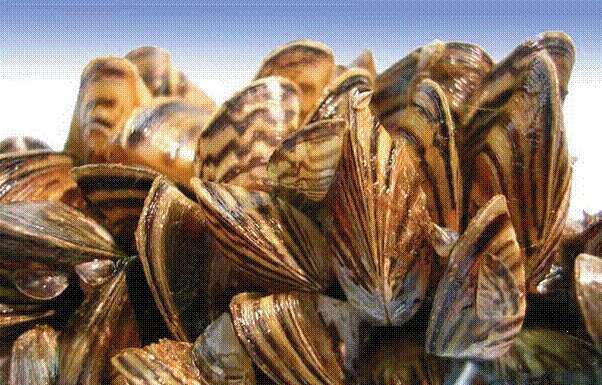Zebra Mussels NPS
From Texas to New York, freshwater sources are being invaded by a tiny but disastrous creature that no one seems able to stop.
"Zebra mussels are a plague," says Lacey Steigerwald, who has watched as they have infested the Lakeway Marina on Lake Travis, where she works.
Smaller than a quarter, these mollusks can grow to densities that can reach more than 100,000 individuals per square meter. They are currently infesting more than 600 lakes and reservoirs across the United States including 17 in Texas. Besides Lake Travis, Lake Austin, Lake LBJ and Lake Pflugerville are also infested.
After being introduced, the mussels take over the waterways. They harm boats, clog pipes, damage water treatment plants and destroy ecosystems.
"They clog pipes like cholesterol. There is no limit to what they'll attach to. Everything that sits in the water will be completely caked within a year," says Steigerwald.
Morgan Klein, a sophomore at The University of Texas at Austin, was looking for a research topic and became fascinated by the zebra mussel problem. This summer she led a team of UT undergraduate researchers studying the severity of the infestation in the Austin area.
As the mussels grow, they eat at alarming rates. They filter out phytoplankton, small zooplankton, large bacteria and other debris, in the process upsetting the ecosystem's balance. They have also been directly linked to the recent bloom in toxic blue-green algae apparently responsible for several dog deaths this year in Austin.
The most concerning thing about the mussels is how hard they are to contain. The larvae start out microscopic, so there is no way to know whether you are transporting the mussels until it is too late. That is why people are encouraged to regularly wash their boats and avoid swimming in multiple bodies of water during the same day.
Credit: University of Texas at Austin
"It was only a couple of years ago that this wasn't an issue, and then all of a sudden they're everywhere," says Klein. "I would love to find a way to cure them, but that's in the future. I'm just seeing what level the problem is right now."
Klein's research is part of the Freshman Research Initiative guided by Susan Cameron Devitt, research educator for the Biodiversity Discovery Stream.
Their study is creating a baseline data set that they hope will help other researchers and state agencies develop a model of spread to predict the future implications of the zebra mussel problem.
Klein worked with three private marinas around Austin to gather samples. They placed sampling plates in the water for a month, retrieved them and took them back to UT to count the mussels.
"I pulled up one of my plates and was analyzing it. There were approximately 1240 zebra mussels on one 10-by-10-inch plate, which is crazy," says Klein.
The last plates were pulled up in July. The plan is to finish analyzing all data and have conclusive results by the end of the 2019 fall semester.
Klein says it has been a great opportunity for her to get hands-on experience addressing a real ecological problem facing Texas and the country.
"It gave me that opportunity to do my own project and take the initiative. Most of the time when people are doing research, you don't get to do your own stuff until graduate school," says Klein.
"We're really happy that UT is out here researching this problem," says Steigerwald, who has seen Klein and the other students working at the marina. "It's such a big problem and spreading so fast that we need all the best brains working on it."
Provided by University of Texas at Austin






















